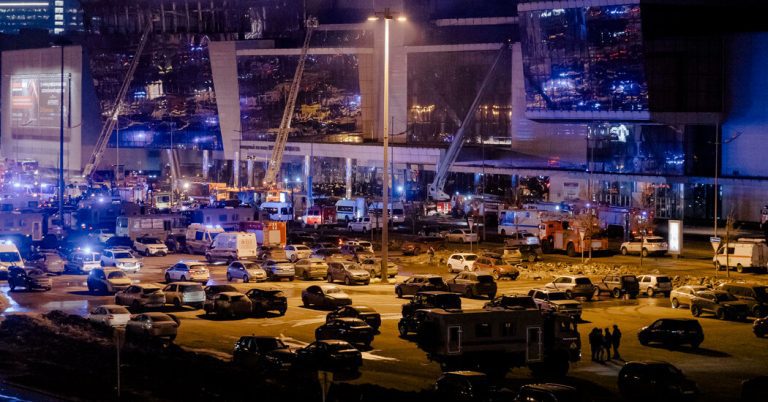An attack on Friday at a popular concert venue near Moscow killed 137 people, the deadliest terrorist attack the Russian capital region has seen in more than a decade.
Islamic State claimed responsibility for the attack. US officials have attributed it to ISIS-K, an offshoot of the group.
Russian officials and state media largely ignored the ISIS claim of responsibility and instead hinted that Ukraine was behind the violence. Ukraine has denied any involvement and US officials say there is no evidence linking Kiev to the attack.
Russian authorities have arrested at least 11 people, including four migrant workers in Russia accused of committing a terrorist act, but have not identified most of the accused perpetrators or their motives.
Here’s a closer look at the attack.
What happened?
The gunmen entered the Crocus City Hall building, one of the largest entertainment complexes in the Moscow region, with a capacity of more than 6,000 people, shortly before the scheduled start of a sold-out rock concert. Armed with automatic rifles they started shooting.
Using explosives and flammable liquids, Russian investigators said, they set fire to the building, causing chaos as people began to run. The fire quickly engulfed more than a third of the building, spreading smoke and causing parts of the roof to collapse. Russia’s emergency service released a video and photos after the fire showing charred seats and firefighters working to clear the debris.
Russian law enforcement officials said people died from gunshot wounds and smoke inhalation.
At least three helicopters were sent to put out the fire or try to rescue people from the roof. Firefighters were only able to contain the fire early Saturday. emergency services said it was mostly out by 5am
The search for survivors ended on Saturday as details of the victims began to emerge. Many of the more than 100 injured in the attack were in critical condition.
Russia’s Investigative Committee, the country’s top law enforcement body, said on Sunday that 137 bodies had been recovered from the charred facilities, including three children. He said 62 victims have been identified so far and that genetic testing is underway to identify the rest.
Where are the perpetrators?
The perpetrators managed to escape from the scene. Early Saturday, the head of Russia’s top security service, the FSB, said 11 people had been arrested in connection with the attack, including “all four terrorists directly involved.” The four men were arraigned late Sunday and charged with committing an act of terrorism, according to state and independent media, and face a maximum sentence of life in prison.
The press service of the Basmanny District Court said the first two defendants, Dalerjon B. Mirzoyev and Saidakrami M. Rachalbalizoda, pleaded guilty to the charges.
He did not specify any pleas from the other two — Muhammadsobir Z. Fayzov, a 19-year-old barber and the youngest of the defendants, and Shamsidin Fariduni, 25, a married factory worker with an 8-month-old baby — according to Mediazona, an independent news means.
The men appeared badly battered and injured as they appeared in court, and videos of them being tortured and beaten while under interrogation were widely circulated on Russian social media.
There were indications that Russia would try to pin the blame on Ukraine, despite the Islamic State claiming responsibility. The FSB said in a statement that the attack was carefully planned and that the terrorists tried to flee to Ukraine.
How are the Russians reacting?
President Vladimir V. Putin, who won the presidential election last weekend, did not publicly address the tragedy until Saturday afternoon. In a five-minute address to the nation, he appeared to lay the groundwork for blaming Ukraine for the attack, claiming that “the Ukrainian side” had “prepared a window” for attackers to cross the border from Russia into Ukraine.
But he stopped short of assigning responsibility, saying those responsible would be punished, “whoever they are, whoever sent them.”
The attack has punctured a sense of relative security for Muscovites over the past decade, bringing back memories of attacks that blighted life in the Russian capital in the 2000s.
Russia declared national mourning on Sunday as there were questions about the identity and motives of the attackers. Flags were left at half-mast on buildings across the country.
Neil MacFarquhar contributed to the report.




